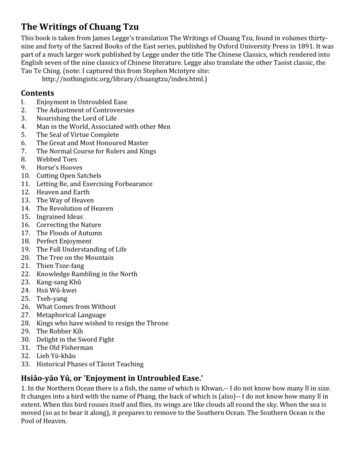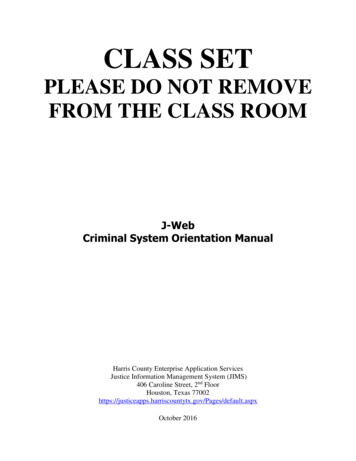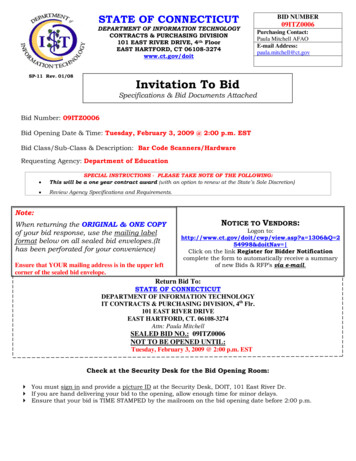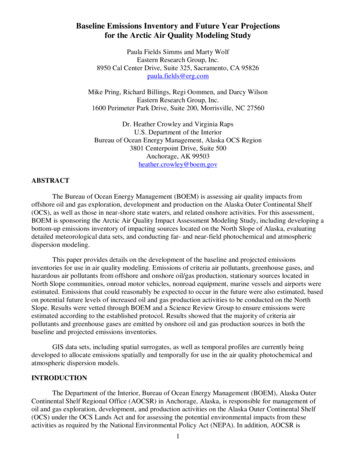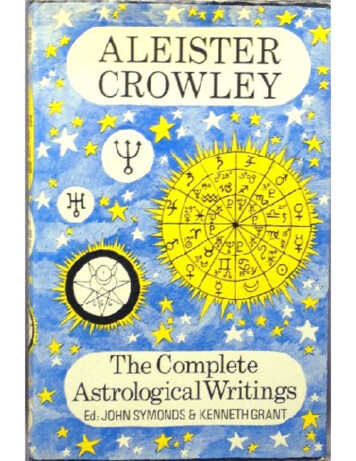
Transcription
Aleister Crowle\'THE COMPLETEASTROLOGICAL WRITINGScontainingA TREATISE ON ASTROLOGYUBER 5%HOW HOROSCOPES ARE FAKEDby Cor ScorpionisBATRACI-IOPHRENOBOOCOSMOMACIIIAS.'6:fl-. - --Edited with annotations byJohn SymondsandKenneth GramDUCKWORTH
First published in 1974 byCtrald Duckworth & Co, Ltd,The Old Piano Factory43 Clouculer Crescent, London NWICONTENTS 1974 John Symonds and Kenneth GrantAll rights reserved, No part of thispublication may be reproduced, stored in arttritval system, or transmitttd, in anyform or by any means, dtctronic, mtchanical,photocopying, recording or otherwise, withoutthe prior permission of tht copyright owner,Editors' IntroductionISBN 0 7156 0806 ITypsdting by Specialised Offset ServicesLimited, LiverpoolPrintcd in Greal Britain by Unwin Brothers Ltd,The Gresham Press, Old Woking, Surrey,IvnIA TREATISE ON ASTROLOGY, UBER 536Preface3The Essential Dignities of the PlanetsThe Triple Tn'nity of the Planets8The General Principles of AstrologyThe l\:faster Key to AstrologyThe Technical Elements of AstrologyThe Twelve I-louses of HeavenThe Aspects of the PlanetsHow to Set up a Figure of the HeavensThe General Principles of Judging a Figure79202325252731The General Signification of the Planets, Signsand HousesMan and the UniverseIIIIINeptuneNeptune in the Zodiacal Signs5661Neptune and the Other Planets62Neptune in the Twelve Houses of HeavenUranusUranus in the Zodiacal SignsUranus in the Twelve Houses of HeavenIndex335382118121169HOW HOROSCOPES ARE FAKED207BATRACHOPHRENOBOOCOSMOMACHIA215221
Editors' IntroductionThe Hermetic Order of the Golden Dawn, which had lodgesLondon,inParis,Edinburgh,Bristoland elsewhere, in structed its members in various branches of occultism. Themoreadvancedattributionsofbrctluenthewere initiatedastrologicalforcesinto theto· thesecretTree ofLife - the planets were attributed to the Sephiroth. thezodiacal signs to the Paths of the Tree - and the relationshipof both systems of astrology and the Qabalah to the Tarot.Crowley began his study of astrology as soon as he enteredthis magical Order in 1898. lie was then twenty-three yearsof age. His attitude to astrology was basically magical; he wasnot a dedicated astrologer but a magician who used astrologyas one of his weapons. This meant that he was less concernedwith astrology as a predictive science than as a means ofassessing for magical ends his own relationships with people.Astrology therefore played a minor role in his activities, andhe left only one work on the subject.ATreatiseOtlAstrologywaswritten1917·18. Crowley also called the worknumerical equivalent of the HebrewinAmerica inLibf'r 536. 536 is theword Maslath, whichsignifies the Sphere of the Fixed Stars, i.e. the Zodiac. It isthus an appropriate number for a work on astrology. Anearlier essay entitledHatrachaphrellobaocosmomachia, whichThe Equinox duringwas published in Crowley'S periodical1913, is includedhere because it deals vith the magicalpractice of expanding consciousness to the stars and planets.The word 'Batrachophrenoboocosmomachia' is made up ofthe Greek words for Frog Mind Ox World Battle, and is aplay on the titJe of tJ1e Homeric mock epic, the Batrachomy omachiatheuscor 'Battle of the Frogs and Mice'. The idea behindofthisbarbarousname,Batrachophrclloboocos-
momachiaEditor's IntroductionAleisler CrowleyVIIIantagonism to the principles of applying common sense to- that is, in pronunciation or vibration - is that itthe science.'is supposed to create a sense of vertigo in which the mind isfreed from its ordinary bounds. Consciousness - so theAs the work was not commissioned by a publisher, andwas never published, it is rather difficult to sec how Evan theory goes - is exalted to infinity by this method.geline tried to cheat Crowley out of 'the profits'.Also included in this volume is a little-known essay ofCrowley's entitled 'How Horoscopes are Faked', whichCrowley did not continue the work on his own. This issurprising forappears here for the first time in book form. It was writtenhe stopped writing on astrology altogether; he had moreimportant things to do . His first task was to found his Abbeyscorpion, a name probably chosen because of the stingingnature of the author's remarks. The essay was published inThe International,he had the time, the knowledge and thecreative force And when he left America for Europe in 1919,in 1917 under the name of 'Cor Scorpionis', me heart of theof Do What Thou Wilt in Cefalu, where he soon set himself toa monthly New York periodical which,write his A utolragiography orConfessio ns , in which, althoughalong with its stable-companion, The FatherlandCrowleywas the editor of The Fatherland - was disseminatinghe included his natal chart, he made no comment on theGerman propaganda in these war years.disposition of the planets.-The idea of writing ATreatise on AstrologyIn his old age, he published- it wa, to beTire Book of Thotlr,his lasttreatment of the subject - arose ou{ of Crowley'Smajor work, an interpretation of the Tarot, based on thediscussions with Evangeline Evans whom he described as 'thesymbolism of the New Aeon. The New Aeon had begun inacomplete1904, inaugurated by Crowley's receiving from his Holymost famous astrologer in the States'. He said of her in hisThe Book of the Law or the newThe Book of Thoth areConfessiOTIS that she made from astrology 'fifty thousandGuardian Angel (Aiwass)dollars a year [butl did not know that the solar system wasbible for mankind. Two pages ofessentiallydevoted toa disk. She thought the planets were stuck atgenerous help with the manuscript, to Ir Raymond IanderNeptune takes fifteen years or so to passand Ir Joe Iitchenson for the material of a footnote dealingthrough a sign of the Zodiac, and told her clients thatwith the theatre, and to Ir Edward Owen Iarsh for severalNeptune being in such and such a sign at their birth, theyhelpful suggestions.must possess various curious powers. When I pointed out thatthis applied to everyone born in three lustres, she was at firstJohn Symondsbewildered, then incredulous; and, proof being produced,Kenneth Grantangry and insulting.'They had in fact been working together onLiber 536;itwas to be published under both their names, and her mindand style are discernible in the text. But the collaborationbroke down, and the work was never finished; Crowley wasnot an easy man to get on with. Evangeline Evans' views onCrowley are not extant, but here is Crowley's summary ofMiss Evans: 'She wanted me to writeazodiac and the Tree of Life. They arcOur thanks arc due to Commander Charles Drage for histhirty years of daily use of the Ephemeris, she had neverobserved thatthereprimed here, immediately after Crowley'S Preface.random in the sky like so many plums in a suet pudding. Inbook on astrology forher. The plan failed through her persistent efforts to cheatme out of the profits, and her obstinate ignorance of theelementary facts of nature combined with an unconquerable1
e,LcJ,,,-- tL(.""Jt'"c/:,hcl,rlA TREATISE ON ASTROLOGY:LIBER 5361
PrefaceAstrologers sometimes make mistakes. From this fact, whicheventhey are scarcely sufficientlybrazen to dispute, itfollows with mathematical certainty that astrology is not ascience but a sham, a quackery and a fraud. I Contrast itsshameful uncertainty with medicine, where no doctor everlost a patient; with law where no lawyer ever lost a case, oreven with arms, where no soldier ever lost a battle!It is true that nine times out of tcn, an astrologer glancingat a stranger can tell at what hour of the day he was born.This must be guesswork, for we do not see how it is done orcan be done. It is an obvious canon of all sound philosophythat unless we know exactly how things happen, we mustdeny that they do happen, or, if ever philosophy cannot sofar close eyes on actuality, we must ascribe them to chance.Thought of this altitudinous brilliance is the guarantee ofhuman progress; it reminds one of the sun rising over thecrest of some mighty pyramid of rock and ice, crowned withthe everlasting snows. True it is that in all cases, an astrologerin the front rank of his profession, gives good advice, kind,shrewd, disinterested and worldy·wise, yet inspired b y adiviner wisdom such as the fact that he spends his life in thecontemplation of the noblest phenomena of nature, that theSoul behind them cannot but operate to bestow; true alsothat any astrologer of eminence can poim to hundreds ofpeople whose life, honour, and property have been preserved1. This is a typical example of Crowley's irony. In his introductionto Magick he writes: ' frater Perdurabo I CrowleyI is the most honest ofall the great religious teachers. Others have said: "Believe me!" He says:"DQn't believe me!'" In the present work, Crowley is soon saying, 'Ifthere be any person of the present day so ignorant as not to recognisethe value of Astrology . . .'
PrefaceA leister Crowley4through his advice. Blit what do these facts prove? What arewe to think of any man who docs not cam his living honestlyby gambling on Wall SHeet, or faking antique furniture, oradulterating the food of the people, or wrecking railroads, ormanufacturing the instruments of war? Why, the fellow is acheat, a scoundrel. The idle wretch polishes off his daily 'evil'in eighteen hours to squander the remaining six in thehideous debauch of sleep.What i s to be done? Thank God, degenerate as our age maybe in some respect, we have a fairly efficient police system.Well, then, send a detective to the astrologer; let her go inwith her eyes red with tcars; let her rock with sobbing as shetells of how her only child lies dying, and all the doctors havegiven up hope. Perhaps the astrologer, for all the knavery andcunning which enable him to pick the pockcts of so manythousand people, may be fool enough to uttcr a few words ofcomfort. Then the matter is simple; justice can be done. Thepolice take action, and fine and imprisonment follow. Thedetective is complimented on the cleverness of her plans; hersalary is raised and a Free People march ever onwards, singingin the sunlight, toward that City which is God.The ageeasy-goingistotoomealy-mouthed, toosentimental, toodeal radically with crime. Even murderersnowadays have a good chance of escaping the electric chair;and the astrologer is worse than the murderer, for he touchesnot the mere vile body. but the pocket. We cannot avoiddeath, but we can die rich. Thcre is even an added blasphemyin the crime of the astrologer, for we know of What Awfuland Beneficient Being - a name too sacred to utter lightly the Dollar is the incarnation. Yet pause, there may be a goodreason for the tenderness of the law toward the astrologer. Itis so certain that any community can destroy its helplessmembers, especially when they are women, by hanging themor burning them, and certain communities have a splendidrecord and a long experience of witch-baiting: statesmanshiphas abandoned these methods for others less effective on thesurface, it argues some wiser consideration, some subtlermotive, some nobler and loftier plan for the uplifting of thehuman race, than the unthinking mind can grasp.But let us put ourselves in the position of some patrioticstatesman!Herewesit,tlIebtoad5andnoble foreheadcorrugated in the agony of intense thought, tlIe firm chinresting on the hand, the venerable beard quivering withemotions less human than divine. We brood upon the True,the Beautiful; from time to time we sigh, as we think of theIncommensurable, the Absolute, or the Greatest Good. Wegaze from fearless and untroubled eyes upon the world, andthe words, half-formed, die in godlike SOlTOW upon our lips,'AJas, humanity!' And as we renect, there comes to us theburning conviction that money is not an unmixed blessing.Prosperity tends to sap the morality of the Common People.Virtue nourishes in communities of simple manners and fadeswhen luxury spreads her vampire wings, money may be acurse. We realise that many people do not use it wisely Theywould be better without it.For example, the class thatsquanders its hard-earned dollars upon the wicked astrologer.But it is not well either that the astrologer should have it.The desire of it has already led him into crime; the obtainingof it has conrirmed him in that offence against the laws ofGod and man. Yet to suppress the astrologer - the first, rash,noble impulse of indignation still leaves the money in thehands of those people who are no doubt better off withoutit. A dilemma indeed! Has political wisdom no solution? Alight dawns in those eyes; the brow relaxes its tension, abeatific smile hovers dove-like on those firm calm lips " wiUnot oppress the astrologer', so the Great Idea takes shape inglory of speech: 'I will merely introduce a Bill to oppresshim Then I will advise him privately that Iamhis TrueFriend, and that for just a few thousand dollars I can preventthat Bill from passing into Law. If he cannot understand themerits of this plan and his brain has probably been stu pefied by his devotion to his foolish quackery, in which nodoubt, poor creature, he has a sincere belief - then I willprosecute him once or t"vice under the old mild law and gethim frightened. Then, surely, he will yield, and the money,viII be no longer where it can only do harm, in the pocketsof the Common People or the wicked Astrologer, but whereit can only do good, in those of the wise and PatrioticStatesman.If this plan has sometimes failed to work as it should, it is
6/Jleister CrowLeybecause [he Astrologer is too often obstinately impervious toall reason and good sense, as well as to manners and goodtaste. He may even exclaim, malicious as a dog cornered by agang of street urchins, that on the whole he would rather goto prison. 'It is not vcry creditable, perhaps, to be at large inacountry withsuch rulers.' So deplorable a temper isindicative of incorrigible vice, a perversity of the soul plainlySatanic. Such people are dangerous to a State; they mayperhaps hit back. Perhaps our sterner forefathers were \viSCTafter all; perhaps we should go after the dollars of [heCommon People in some other way, and deal with theAstrologer by reviving the methods of the inevitable MatthewHopkins.2Unless we can do so, and there is indeed some danger thatthose contemptible creatures, the ComJ!lon People, might notreadily acquiesce, it is to be feared that we shall see the ruinof Civilisation with its greatest glory, our unique politicalsystem, and become impotent witnesses of that catastrophe,the Triumph of Astrology.A.C.THE ESSENTIAL DIGNITIES OF THE PLANETSThe ExaUation ofthe Planets0b'Q,21n '!IPlanetsRuling19· 3·3·IS·IS?19· 14··tl3 2S·'!' 19· 27·2 . Matthew Hopkins (d.1647), lawyer of Ipswich and Manningtree,who became the notorious 'Witch-Finder' General, and an authority onthe devil's mark, made by the devil's claw, which may be found on thebody of the suspected person.Herschelrules'Y'"II""b'21· - 21nn21Ill.fl'\l1)!S1.0the4Signs of theZodiacKerubic'")(Signs:Neptune,theCommon Signs, and Primum Mobile, the 4 Cardinal SighS.4A planet is in its Fall when opposite to its Exaltation; in itsDetriment when opposite to its Realm.
8A h'islnCrowleyTHE TRIPLE TRINITY OF THE PLANETS'VThe Spiritual0The Human (Intellectual)-'"The Sensocy (Bodily)'1/The SpiritualhThe Human (Intellectual)'" The Sensocy (Bodily)'21The Spiritual The Human (Intellectual)* The Sensory (Bodily)1J1I1ISelf(ego)The General Principles of Astrology\ViIIof t heSelf.The physicaJ constitution of the Universe is the basis of the4 -science of Astrology ; and in order to explain from whatprinciples we deduce our judgments of its movements wemust endeavour to gain a clear idea of the nature of thoseRelationwith thenon-ego.movements.The Spiritual0The Human'"The AutomaticThe Creative'21The Paternal The Passionate The Intuitive The Volitional The IntellectualFor "intellectual"one mightspeaking, a flat disk. It whirls in one plane. The planetsdepart slightly from this plane, but only slightly. How this1JIConsci ousness.Astronomy, and it is not yet satisfactorily settled. But thegeneral idea is that there was at one time, we do not knowwhy or how, an enormous flaming mass revolving in space. Incourse of time certain heavier portions collected together bythe force of gravity, and this mass being coherent, was flungoff, retaining. however, its general movement with regard tospace, but having also a revolutionary movement of its own1fin the same plane. This body constantly radiating its heatMode ofaction on thenon-ego.into space gradually contracted and solidified. This first bodywas the planet Neptune. It is by no means certain thatNeptune is the most distant planet. Students of astronomyare well aware of how it was discovered. In c?lculating dIemovement of Uranus certain perturbations were discoveredp;u.,r of S verilyhless spherical in shape. This is not the case. It is, roughlystate of affairs came to be, has long been the problem ofPillar of Mercy'1/Many people have an idea that the solar system is more or'eMiddle Pillar'VIwhich could not be accounted for by any of the knownlIplanets. Astronomers were therefore led to imagine Ulat thereMode of Selfexpression.say "conscious".might be some other body yet undiscovered and probablybeyond Uranus. Calculations were made to determine theprobable position of such a body, which was then looked forwith extreme care, and ultimately Adams and Le Verrierdiscoveredthelimitsof its possible position with suchaccuracy that Galle of Berlin discovered it in1846.Further
10The General Principles of AstrologyA/euler CrowleyIIobservations and calculations show that there arc stiU certain'moons'. These were very small in comparison to the presentmovements of Uranus not fully accounted for by Neptune;orb, cooled quickly,and there are also perturbations in Neptune himself whichsuggeststhattheremaystillbe another planet outsideNeptune. If 5Q, however, the distance is probably very greatindeed. Our reasons for thinking so are based on Bode's Law.Bode was a German astronomer who flourished in the lasthalf of the eighteenth and first quarter of the nineteenthcentury and the law to which he has given his I arne is asand lost their internal revolutionarymovement. The moon of the earth, for example, though itstill revolves around the earth, no longer turns upon its ownaxis, and always presents to us the same face.The important item in all this is that all these movements,complex as they are, and we have made no attempt todescribe that complexity in detail, but merely to give a crudeidea, take place in one plane of no great thickness and in thefollows.same main directions.distance of Mercury from the Sun in astronomical units. Themeasurably greater than even the farthest of the planets. It isIf we take the number 4 and divide it by 10 we gel theNow the fixed stars lie about the sun at distances im·astronomical units being the main distance from the Earth toimpossible for the human mind to form any conception ofthe Sun - add 4 to 3 and divide it by 4 and we obtain thethe magnitude of space. These stan; surround the sun com·to 4 and we get the distanceBut to resume the simile of the wheel, if we look along theof Mars; add twice twice twice 3 to 4 and we get the meanspokes of that wheel, we shall perceive a narrow band ofdistance of the asteroids. This same proportion continues,stars,distance of Venus; add twice 3 to 4 and we get t. heof the Earth; add twice twice3multiplying 3 four times by 2 and adding it to 4, and thendividing by 10 we get the mean distance of Jupiter. MUltiply·ing the 3 by 2 once more we get the distance of Saturn; yetagain and we get that of Uranus. With Neptune, however, thelaw breaks down. According to that law the mean distanceshould be38.8,whereas it is only30.No rea.! reason isknown for this la , though it is hoped that light may bethrown upon the subject by further researches in celestialmechanics and the evolution of the solar system. The law waspletely; there is no part of the heavens in which they are not.and. thesenaturallygroupthemselvesinto twelveconstellations disposed at approximately equal distances. Wepay more attention to these stars because they lie in the sameplane as the general movement of the solar system, and theirinfluence consequently combines naturally with that of theplanets. Their effects have been studied from time immem·orial with lhe utmost care and described by ancient astrol·ogers. To these constellations names have been given. Theyare as follows: Aries, Taurus, Gemini, Cancer, Leo, Virgo,Libra,Scorpio, Sagittarius, Capricornus, Aquarius, Pisces.at least of this service, that it led to the discovery of theThese names are mostly those of symbolic animals. It is veryAsteroids, which are supposed to be the fragmenls of anfanciful to try to see any resemblance of these animals in theexploded planet. No satisfactory explanation of the excep·relative po itions of the stars concerned. The names havetion of Neptune to this law has been put forth.been given because of the astrological significance thereof,The same process repeated itself several times, and thuswere formed Uranus, Satum,Jupiter, the Asteroids, Mars, theEarth, Venus, Mercury. Many other bodies were formed inprecisely the same way, but they lacked the principle ofcoherence in the same degree and, soon after separating fromthe Sun, themselves broke up into Asteroids and meteors,and this is one of the many proofs that astrology is olderthan astronomy.The materialistic school of philosophy has endeavoured togive the impression that we possess some real knowledge ofthe nature of the forces which we see at work around us.Such an impression is entirely false. All forces arc essentiallycountless millions of which throng inter.planetary space.mysterious.Some of these bodies, moreover, behaved at first like the sunmeasurement,We know from observation. comparison anditself, and threw off smaller bodies of the class w.hichreasonable conception of their true character. Let us take, for,howthey act. We cannot even form any
nit!Aleister Crowley12CCllcral PnllCliJ/es of .Istrology13example, the force of gravity. In order to explain its action,modern chemist or physicist for his definition o f matter, hewill reply to you in temlS identical with tllOsc which werecalled 'the ether', They have been obliged to define this etherused by the philosophers of lhe Middle Ages to define Spirit.infinitely tenuous, infinitely imponderable. That is to say, itsciences. He docs not endeavour to conceal his ignorancemen of science have been obliged to postulate a substancein mathematicill terms. It is infinitely rigid, infinitely clastic,is not matter at all in any ordinary sense of the word, for itpossesses qualities involving infinities and therefore is rathertheoretical than actual.In the same way nobody knows what electricity really is.There is a story of a professor who was declaiming to thisThe astrologer is more frank than the professor of otherbeneath an elaborately embroidered cloak of metaphysicalphrases. He is content to accept the dictum of the School men,omnia exeunt in myslen" um,[everythingendsinmystery J, by which they meant that i f you follow any ideafar enough - if you keep on asking how and why and whal,of resting contented with a superficial, half.wayeffect before a class of students and wound up by thunderinginsteadstudent in the back of the hall, ovcrcome by the heat or theblank wall of the inconcci"abJe. If there be any person of thedramaticaJly. 'Does anybody know what electricity is?' Aexplanation, the result is always the same. You reach thediscoursc, had been half asleep. The last sentence arouscdpresent day so ignorant as not to recognize tlle value ofthehim read Herbert Spencer'shim and he sprang from his seat from habit. Thcn meetingcold eyeofthe professor, he became embarrassed,stammered, 'I knew, Sir, but I've forgotten.' 'J ust my luck,'astrology and base his judgment on materialistic groups, letFirSl Principles"In that bookwhich ranks with David Hume's as one of the mqst masterlyretoned the learned man. 'There was only one man in thetreatises on nature, as scen by scientific scepticism, he willIf we take even so simple a phenomcnon as the expansionof God or of nature is satisfactory to the mind. Nay more, hewhole world who kncw and he has forgotten.'find it prove with admirable lucidity that no possible theoryof bodies through the action of heat, wc are equally involvedshows that no such thcory is even intelligible to the mind.molccules of a body move more violently whcn what is calledworry ourselves too much about metaphysics. We had betterin mystcry. There is a son of theory that for some reason theheat is applied to them, because heat is conceived of as amode of manifestation or accompanying attribute of motion.But these molecules are themselves quite theoretical. Theirexistencehasbeeninvented in order to explain certainphenomena of chemical action. These imaginary moleculesarc composed of yet more imaginary atoms, which weredefined, as the name implies, as ultimate indivisible particles f homogenous matter, but that was just a century ago, ands lllce then, all sorts of other phenomena have been observedwhich make i t impossible any longcr to imagine the atom asAs practical people, we shall therefore do well not toacquiesce in the statement that everything is relative andconfineourselvesto observing and measuring the forceswhich we perceive in action. It is not an argument againstAstrology to inquire why docs tlle movement of a certainplanet produce certain effects. We do not know any morethan the physicist knows why a nerve contracts on theapplication of an electric current. We do not wish to make sophilosophical an inquiry. We are only concerned to informourselves as to whethcr it acts. Theoreticalaprion" consider ations must not be advanced in astrology any more than anya new hypothesis, that ofother science. Such considerations have been the curse ofwhether these electrons are matter, he may tell you that, onscience than any other form of human folly. The readerindivisible - henceelectrons,andhasarisenwhen youinquire of the physicist as toevery science. They have done more to retard the progress ofunreasonable theory is that whichsholdd study the works of TJI. Huxley3 on this point. Ininto combinations of things which are not. If you ask a3. Thomas H nry Huxley (1825-1895), English biologist whoinvented th word 'agnostic'. lie def nd d Darwin's Ol'igirl of Spui s·,1895, against th attacks of Bishop Samuel Wilb rforc .thewhole,theleastsupposes them to be merely strains in the ether. In otherwords, the things which are, ha e been resolved by science
.1It'isterIICrowleyThe Genl!ral Pn l lClplesformer days people would begin their deductions frolll whatthey supposed to be an indisputable proof of the attributesof the Divinity. Whenever they came across a fact whichappeared out of harmony with this preconceived idea of HisnalUrc they tried to explan away the fa t, but as facts arc'chicls that \vlllna ding' they saw that their castle in the airmust tumble and consequently resorted to the expedient ofburning any person alive who appeared interested in thediscovery of awkward facts. Such a policy was naturallysuicidal.of .lslrology15prediction. like any other, would not b e a certainty. It wauldonly be a very strong probability, but humanity habituallyactS on probabilities of this kind. If I walk down FifthAvenue, a motorcar may smash a wheel or skid or in someother way go wrong and interfere with my peaceful promen·ade upon the sidewalk, but I shall be a great fool if I avoidthe sidewalk for any such reason. In other words I habituallypredict that no such accident will occur. So far things havefallen out according to my expectations.Now when an astrologer predicts that a person \'I'ith l\larstheories of nature. Like every sane science, It contenlS itselfin the seventh house afflicted will make an unhappy mar·riage, if he marry at all, he is employing precisely the sameshooting range - we sec a puff of smoke and hear a report. Inobservation and comparison of innumerable facts. I Ie hasNow, astrology has nothing whatever to do with anywiththetruescientificmethod.Supposewe are on aqualities of sound reason and judgment based on scientificanother part of the ground almost immediately afterwards,observed and noted and tabulated; filed among his papers arewhatever to suppose any connection between these cvents.every case,the same thing happen a hundred times running or evcnwhen he sees another such figure in predicting unhappywe hear a bell ring or see a nag wave. There is no rcasonThey may be pure coincidences. Suppose, however, we secsuppose that we see the nash, hear the shot a hundred timesand that on seventy or eighty occasions the waving of the nagfollowed, the situation becomes entirely different. We have,then, a right to say that there is, in all probability, somecausal connection. It would however still remain incompre.hensible to us, why a nash in one part of the earth shouldcause the waving of a flag in another part. There would benothing to tell us that there was a preconcerted arrangementbetween theshooter, the marker, and even if we weresubsequently informed that such was the case, we should stillbe at a loss for the motives of such an arrangement, and inorder to discover these we should have to dive into a dozensciences, ballistics, history, ethnology, and I know not howmany more. At the end of all that we should find ourselvesup against the great metaphysical problem which we havealready dismissed as improbable.But it would be quite fair for the observer to draw certainhundreds of horoscopes in which this position occurs and inthe person born with this position has beenunfortunate in wedJock. He is, therefore, absolutely justifiedmarriage.It must not bc expected that any responsible astrologerelaims to be absolutely right. There ar
The Hermetic Order of the Golden Dawn, which had lodges in London, Paris, Edinburgh, Bristol and elsewhere, in . of both systems of astrology and the Qabalah to the Tarot. Crowley began his study of astrology as soon as he entered this magical Order in 1898. lie was then twenty-three years


